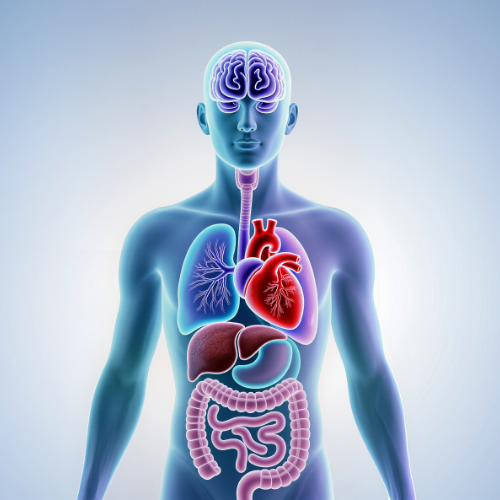Is Stress Hijacking Your Hormones?
Stress is often described as an emotional experience.
Feeling overwhelmed.
Feeling pressured.
Feeling like there’s never quite enough time.
But inside the body, stress is not a feeling. It is a hormonal event. Whether or not we consciously register stress, our hormones respond to it constantly by adjusting metabolism, energy availability, immune activity, sleep depth, and even how safe the body feels from moment to moment. At the center of this response is cortisol.
Your Heartbeat Is a Longevity Signal. Here’s How to Strengthen It
When most people think about heart health, they focus on crisis prevention. Heart attacks. High blood pressure. Cholesterol numbers. A single moment in the future when something “goes wrong.” But from a physiology and longevity perspective, your heart is not a device you monitor only when it malfunctions. It is a continuously responsive organ that reflects how well your entire system is adapting to life.
Your heartbeat conveys information about your nervous system, hormonal balance, metabolic flexibility, sleep quality, and cumulative stress load. In other words, your heart is not only a pump. It’s a signal. And when we learn to interpret and support that signal, cardiovascular health stops being a distant outcome and becomes a daily, trainable capacity. This is where longevity science has shifted in recent years… away from isolated markers and toward patterns of adaptability, resilience, and recovery.
How to Start Your Day Calm, Not Chaotic
For many people, mornings quietly set the tone for the entire day.
Not because of what gets accomplished, but because of how the nervous system is engaged in those first moments of waking. A rushed start, even a subtle one, can create a sense of urgency that lingers well into the afternoon. A steadier start often creates more space than expected, even on busy days.
By late January, this becomes especially noticeable. The initial push to “get back into routine” has passed, and what’s left is reality. Work demands are real. Family needs don’t disappear. Energy may be improving, but it still feels finite.
This is where morning routines often get misunderstood.
A resilient morning routine is not about doing more before 9 a.m. It’s not about optimization or discipline. It’s about how the body transitions from rest into engagement, and whether that transition supports steadiness or reinforces stress.
This article explores what actually makes a morning routine resilient, why calm matters more than control, and how to shape mornings to support energy rather than drain it.
Moving from Crash Recovery to Sustainable Energy
For many people, January begins in recovery mode.
There’s a quiet awareness that energy dipped too low at some point last year. Maybe it happened slowly. Maybe it followed a specific season of overextension. Either way, the body is no longer interested in being pushed the same way.
At first, recovery often looks like rest. More sleep. Fewer commitments. A softer schedule when possible. This phase matters, especially after prolonged stress.
But at some point, another question appears:
How do I move forward without crashing again?
This is where many people get stuck. They don’t feel depleted in the same way anymore, but energy still isn’t reliable. Some days feel steady and clear. Other days feel fragile. It becomes hard to tell what’s helping and what’s quietly draining reserves.
This article is about bridging that gap (moving from crash recovery into sustainable energy) and learning how to track energy in a way that actually supports progress, rather than turning it into another performance metric.
Why You’re Still Tired and What Your DNA Has to Say About It
By January, many people have already tried to “get back on track.” Sleep schedules are adjusted. Work routines resume. Nutrition feels a bit more intentional. Yet despite these efforts, energy still feels inconsistent.
This lingering fatigue often leads to a familiar internal dialogue: I’m doing the right things, so why don’t I feel better yet?
For a growing number of high-functioning adults, the answer isn’t found in willpower or motivation. It’s found at a much deeper level… inside the mitochondria, and within the genetic instructions that shape how those mitochondria function.
This article explores why energy recovery can stall after stress or burnout, how your DNA influences cellular energy production, and why understanding your mitochondrial blueprint can shift how you approach recovery.
Still Wired & Tired? Try This 3-Step Nervous System Reset
January often arrives with a quiet expectation that energy should simply return. The calendar flips, routines resume, and there is an unspoken assumption that rest naturally follows time off. Yet for many high-functioning adults, especially those coming off a demanding year, the body does not immediately respond that way.
Instead, sleep remains light or fragmented. Focus feels inconsistent. Motivation exists, but it takes more effort to access. Even moments of stillness can feel oddly uncomfortable. This state is commonly described as “wired and tired”—a pattern where the nervous system remains activated long after the external stressors have eased.
This explains why your nervous system may still be in a heightened state, and how to guide it back toward regulation in a way that is steady, supportive, and sustainable.
Recap, Celebrate, and Tease What’s Coming in January
The final days of the year often arrive quietly, even though we’re told they should feel conclusive. There’s reflection mixed with fatigue, a sense of closing one chapter while not quite ready to open the next. Many people feel pressure to summarize, assess, or “wrap things up,” even when their body and nervous system are asking for rest instead.
Rather than treating the end of the year as a finish line, it can be more supportive to see it as a pause point. A moment to acknowledge what’s unfolded, notice what you’ve learned, and gently orient yourself toward what’s next—without judgment or urgency.
Don’t Just Set Goals. Program Your Brain to Reach Them
Most people set goals on paper once a year, feel inspired for a moment, and then return to old patterns by February. It’s not because of lack of discipline… it’s because the brain doesn’t change through logic alone. It changes through rehearsal. Visualization is a tool that helps your brain combine:
emotional regulation
clarity
motivation
habit formation
future-oriented planning
When used correctly, it becomes a powerful way to prepare your nervous system for the year you want to create without pressure or perfectionism.
Feeling Off Track? Here’s How to Reset Without a Crash Diet
Even if you were mindful with your choices, it’s normal to feel a bit out of rhythm after holiday meals, social gatherings, travel, or changes in routine.
Maybe your sleep feels lighter.
Maybe your cravings feel stronger.
Maybe your stress feels higher or your energy dips more quickly.
This isn’t about willpower or “getting back on track.”
This is biology.
The holidays often mean higher sugar intake, irregular meal timing, richer foods, alcohol, and elevated stress. This combination directly affects blood sugar, inflammation, cortisol, and your circadian system.
The good news? Your body is highly adaptive, and you can recover without extremes, restrictions, or crash diets.
This article will show you how.
Why Year-End Reflection Feels Hard (Even When You’ve Had a “Good” Year)
The end of a year often comes with pressure… pressure to evaluate, summarize, judge, compare, or declare whether it was “good” or “bad.” And for many people, reflection becomes tangled with guilt:
“I should have done more.”
“I let things slip.”
“I lost momentum.”
“I didn’t stay consistent.”
But here’s the truth most people miss: Reflection is not a report card. It’s a recalibration.
It’s about understanding your habits, your needs, your wins, your growth, and the season of life you're in, without tying them to your worth. What matters most isn’t what you didn’t do. It’s what you learn from what happened.
Gratitude: The Ultimate Holiday Reset
Between gift lists, deadlines, and social expectations, it’s easy to lose sight of gratitude during the holidays. As we move through the season (often juggling more than usual) gratitude becomes one of the simplest and most stabilizing wellness tools we have.
Far from being “feel-good fluff,” gratitude has measurable effects on your brain chemistry, immune function, and emotional resilience. It reduces anxiety, improves sleep, strengthens relationships, and even supports healthy aging.
As the pace around you quickens, even a few intentional moments of appreciation can shift your physiology, rippling through your entire body.
The UTI That Showed Up Uninvited
Sunday morning started peacefully enough… until it didn’t.
I woke up with that feeling. If you’ve ever had a UTI, you know exactly what I mean. It’s unmistakable. Unforgettable. And absolutely capable of derailing your entire plans for the day in under 60 seconds.
Don’t Let the Holidays Wreck Your Sleep
Between late-night parties, family visits, travel plans, and endless to-do lists, the holiday season can quietly sabotage your sleep.
Even people who usually sleep well can find themselves tossing and turning, waking in the middle of the night, or running on caffeine by mid-December. And poor sleep affects your immune system, hormone balance, appetite, and emotional resilience.
When your sleep goes off track, your whole rhythm follows. The key is to protect your circadian balance so your body can recover, even when your routine shifts.
holiday sleep, travel sleep tips, circadian rhythm, sleep and stress, party recovery, insomnia during holidays, jet lag, sleep hygiene, holiday wellness, The Nourished Holiday
Holiday Sugar Spikes? Your Brain and Body Say No Thanks
Cookies at the office, festive drinks, endless desserts — sugar seems to appear everywhere during the holidays. A few indulgences aren’t the problem; it’s the rollercoaster effect that follows constant snacking and late-night treats.
When your blood sugar rises and falls sharply, you might notice:
Afternoon fatigue or brain fog
Irritability or anxiety after meals
Cravings that hit even when you’re not hungry
Restless sleep or energy crashes
Those symptoms aren’t about willpower — they’re physiology. Understanding what’s happening inside your body helps you make choices that keep you feeling balanced.
holiday sugar, blood sugar balance, mindful indulgence, sugar cravings, healthy holidays, stress and sugar, emotional eating
How Rituals Anchor You in Uncertain Times
When life feels unpredictable, the nervous system reacts. Whether it’s global events, personal changes, or shifting routines, uncertainty can trigger stress, anxiety, and even feelings of helplessness.
But there’s a powerful antidote: rituals.
Rituals aren’t just habits or routines. They’re intentional actions that provide grounding, meaning, and a sense of control. Even something as simple as a morning cup of tea, a daily walk, or journaling for five minutes can create a sense of stability in the midst of chaos.
In uncertain times, rituals serve as an anchor, steadying you when external circumstances feel shaky.
Falling Back Without Falling Off Track: How to Adjust When Daylight Saving Time Ends
When the clocks “fall back” in the fall, we technically gain an hour of sleep, but our bodies don’t always agree. While the time shift may feel small, it can disrupt your circadian rhythm, your internal 24-hour clock that governs sleep, energy, hormones, and even appetite.
The result? You might feel groggy, hungry at odd times, or wide awake long after bedtime. Fortunately, with a few intentional strategies, you can reset your sleep after Daylight Saving Time smoothly and wake feeling balanced again.
how to adjust after daylight saving time ends
daylight saving time sleep adjustment, how long to adjust after daylight saving, circadian rhythm tips, fall back sleep tips, end of daylight saving time
Quiet the Noise: How Hypnosis Helps You Regain Control of an Overthinking Brain
You lie in bed exhausted, but your mind is running through tomorrow’s to-do list, replaying old conversations, or worrying about what might happen next week. You try to distract yourself, but the cycle continues.
Overthinking is more than just a mental habit — it’s a pattern your brain and nervous system have memorized. And while meditation or relaxation might help temporarily, many people find their thoughts snapping right back into overdrive.
That’s where hypnosis comes in. Unlike surface-level relaxation, hypnosis works directly with the subconscious mind — the place where overthinking patterns are stored — to help you quiet the mental noise and regain control.
The 4-Second Rule That Builds Emotional Resilience: From Reactivity to Response
We’ve all had moments when emotions hijack our actions before reason has a chance to step in. Maybe you snapped at a loved one, sent a hasty email you later regretted, or let your heart race through a sleepless night replaying a stressful situation.
In those moments, it feels like there’s no gap between trigger and reaction. The body takes over, and the mind scrambles to catch up.
But there is a gap. And within that gap lies the power to transform your stress response.
The 4-second rule is a simple, science-backed micro-pause technique that helps you shift from automatic reactivity to calm, intentional response. With practice, those four seconds can change the way you handle stress and build lasting emotional resilience.
Your Mind Is Not Separate from Your Body: How Thoughts Shape Biology
Have you ever noticed how your body instantly reacts to a stressful thought? Your chest tightens, your stomach flips, and your breath becomes shallow. Or, on the flip side, when you imagine something joyful (like holding a loved one or laughing with friends) your body softens and you feel lighter.
This isn’t just a coincidence. Your mind and body are in constant conversation, influencing each other every second. The way you think not only affects your mood but also your biology, from your heart rate to your hormones, from your immune system to your sleep.
Modern science confirms what ancient traditions have long taught: your mind is not separate from your body. Every thought leaves a biological imprint.
Noise Pollution: The Stressor You Don’t Even Notice
You probably think of pollution as something in the air, water, or food. But there’s another form of pollution you’re exposed to every day, and it may be quietly draining your energy and disrupting your health.
It’s noise.
From traffic and construction to constant notifications, background TV, and even household appliances, noise is everywhere. Because we get used to it, we often don’t realize its effects. But research shows that chronic noise exposure can stress the nervous system, interfere with sleep, and even increase the risk of long-term health issues.
The good news? Once you become aware of it, you can take simple steps to protect yourself from the invisible stress of noise pollution.




















